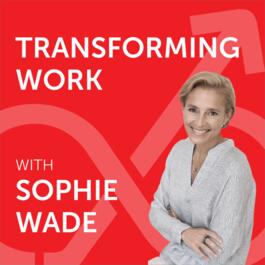
Minter Dial — Purposefully Integrating Empathy and AI at Work
Minter Dial and the podcast’s host, Sophie, discuss empathy at work in the new technology-driven era of business and work. They both draw from their books—Minter’s rerelease of Heartificial Empathy: Putting Heart into Business and Artificial Intelligence and Sophie’s second book Empathy Works: The Key to Competitive Advantage in the New Era of Work. They explore and debate how to integrate empathy effectively as well as bring a human-centric approach to the AI-infused business and working landscape. Minter shares his insights about the importance of companies’ having an ethical framework that incorporates empathy as they integrate more AI. KEY TAKEAWAYS [03:48] Minter’s journey into empathy was by the “back door”. [05:45] Recognizing the benefits of teaching empathy to sales people, l’Oréal initiates a program for those contracted to sell their products. [06:30] Minter finds the approach ironic and reflects on authentic leadership. [07:05] Assessing yourself for empathy skills and how to connect with somebody else's experience. [09:22] Why haven't we been working with more empathy? [11:20] Other factors elevating the need for empathy at work—now. [12:56] Has our empathy—and deeper understanding of each other—generated during pandemic times all evaporated? [14:35] What is behind the high levels of unhappiness and unfulfillment at work? [15:10] The significant shift in the US in people’s views about their working lives. [16:12] What drives empathy that isn’t intentional and authentic. [18:30] How does empathy and flexibility improve business results? [20:15] The pros and cons of having choices. [21:00] Can you engage people individually in a traditional company that has 10,000 employees? [22:02] Focusing on the needs of individuals within a unit. [22:40] How the pandemic helped us understand different approaches and methods. [23:45] Aligning empathy with the business objectives and all the players across the ecosystem. [23:45] The “why” of any company is central to making the organization work. [24:22] Minter believes empathy is a pre-condition for an ethical framework. [25:29] AI is something to bring your humanity to. Minter shares examples of how AI can be used. [27:22] Are we thinking sufficiently about why and how we are introducing generative AI? [29:19] Bettering people’s lives at Redken—connecting people along the value chain with purpose. [32:20] How gen AI search results reflect our collective consciousness—good and bad—elevating the need for an ethical framework. [35:15] Minter gives permission to be imperfect, pushing out and trying. [37:25] Empathy doesn’t mean always being nice—but making tough decisions. [38:18] What standard are we holding ourselves to? How well do we understand ourselves? [39:15] Minter calls for more self-awareness, especially to understand our reasoning and flaws. [40:49] IMMEDIATE ACTION TIP: Do something for others and reconnect with the ordinary things in life. RESOURCES Minter Dial on LinkedIn Minter on Twitter Follow Minter’s Substack DIALOGOS — Fostering Meaningful Conversations Culture of Narcissism by Christopher Lasch QUOTES (edited) “I do feel that the level of unhappiness and unfulfillment at work is about as high as it gets. And perhaps the lingering element is ‘What is this all about? what, what are we doing, Sophie, on this earth? What is my life for?’” “I feel that empathy is a precondition for your ethics, but it doesn't mean you’re good. At the end of the day, what are you trying to achieve? Who are you? If you use empathy with manipulation, you’re going to have manipulative ethics.” “If we want to call AI a step change like the printing press, I think it’s possibly the right call. But I would wish that we would be more focused on the meaningfulness of our business as opposed to the technology that’s going to drive the numbers.” “This notion of having a purpose that resonates inside and out is really key. Being customer-centric is lovely — It’s probably a sine qua non. However, make sure that it’s congruent with what you’re trying to live as an employee in the organization.” “The permission I give with AI is to push out and try stuff. And if you accept that you are flawed, then it becomes easier to understand the imperfection that comes out, because that’s what we’re trying to do. The intention is right.”
From "Transforming Work with Sophie Wade"




Comments
Add comment Feedback